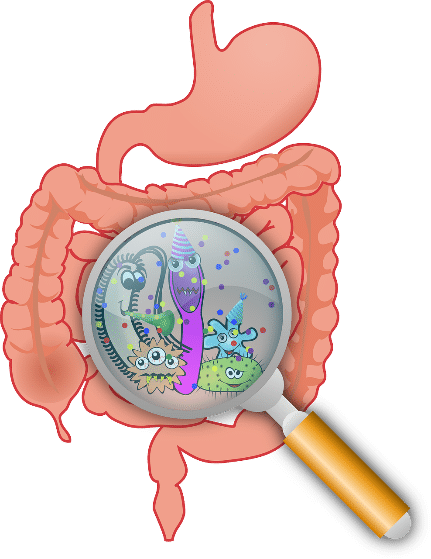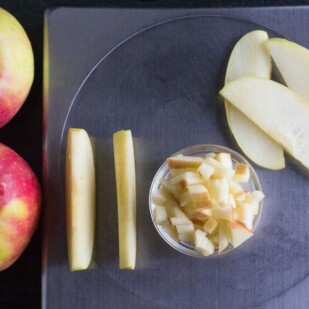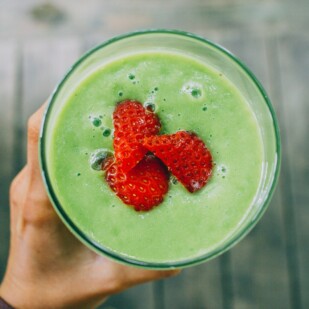The Fascinating Microbiome
As a dietitian, I can’t help but be totally fascinated by the microbiome. It’s cool, but also a confusing topic with lots of “geeky” terms that you might not understand. This article will explain what the human gut microbiome is, why it’s important, how we can change it, and how it impacts our overall health.
It’s amazing to think that every surface of our body is literally covered in microbes, which are tiny life forms such as bacteria. Even though these microbes can be found everywhere in our body, the largest number are living in our digestive system, and do affect our gut health.
Even though these microbes can be found everywhere in our body, the largest number are living in our digestive system, and do affect our gut health.

The Mighty Digestive System
The digestive system starts at the mouth and ends with the large intestine and anus. It might surprise you to learn that the types and amounts of bacteria vary quite a bit through the digestive tract.
For example, the number of bacteria found in the mouth is less than 1% of that found in the large intestine. Because of the swift movement through the stomach and small intestine, the number of bacteria found here continue to be relatively low.
The large intestine, on the other hand, contains the largest amount and variety of bacteria in the body.
What Bacteria Do For Us
Now that we have a better idea of what the microbiome is, why does it matter? What impact do they have on human health?
This abundance of microorganisms does some pretty important things for us. One of their key jobs is to help with our immune system. The bacteria interact with our immune system to defend our bodies against harmful pathogens. They also teach our immune system how to do a better job of fighting viruses and infections.
Pretty amazing, huh? So, when the gut microbiota is healthy and strong, so is our immune system. It’s a good thing to be host to these healthy bugs!
The Impact On Metabolism
Another vital role of these microbes is to influence how we digest the food we eat, and also how many calories we can derive from food. Personally, I think this is an amazing area of research, and we continue to learn more each day about the connection between the gut microbiota, digestion and metabolism.
Other Impacts Of The Microbiome
Who would have thought that the microbes living inside us would be connected with our mood and brain function? It’s true, there is a connection between the amount and types of bacteria living in our gut, how we feel and our brain health.
… there is a connection between the amount and types of bacteria living in our gut, how we feel and our brain health.
Studies have also shown connections between the microbiome and obesity, diabetes and general gut inflammation. The composition of the gut microbiome affects the intestinal barrier, which could increase susceptibility to certain diseases.
Interestingly, germ-free mice are used in many studies to provide the right testing environment for studies involving fecal transplants and the gut endocannabinoid system, which regulates gut motility, permeability, and inflammatory responses.
We still have much to learn of these interactions, but the research is promising.
What Can Change the Microbiome?
An interesting feature of the gut microbiota is its ability to change from day-to-day. There are many factors that can influence it and science teaches us more about this every day.
The environment we live in can affect the bacteria living in our bodies. There are differences between people who live in rural areas with lots of animals and dirt when compared to those living in an urban area with little green space.
There are also marked differences between the microbiota of those living in Africa in comparison with the United States. Our genes, our environment, antibiotic use, the nutrients in our diet, an infection and/or supplements can all affect our microbiome.
 What You Eat Matters
What You Eat Matters
The food we eat has the biggest influence on changing our gut microbiota. It might surprise you that diet changes can impact the composition of the bacteria found in the gut in as few as 3 days.
The food we eat has the biggest influence on changing our gut microbiota.
Studies also tell us that the microbiota of someone who eats a vegetarian diet, or one high in whole grains, differs from someone eating a diet high in animal products.
As you can see, there are plenty of ways you can change the community of bacteria living in your gut. The way you eat, where you choose to live, and even the types and frequency of medications you take can all impact your gut microbiota, and ultimately your overall health.
Taking medications such as antibiotics can also affect our gut bacteria, but not in a good way. As you may already know, antibiotics not only kill the bad bacteria, but they also kill some of the good guys.
Probiotic supplements can change the microbiome, but are often not recommended during the Elimination and Challenge Phases of the low FODMAP diet, as they can alter your reaction to FODMAPs, which you are trying to assess at that time. As always, please work with your Registered Dietitian on the best diet for you and whether supplements are indicated.
Changes are often temporary and the body has the ability to rebound, but not always.
Connecting the Gut Microbiome with GI Health
There is increasing evidence that suggests changes in the gut microbiota are involved in common gut disorders such as irritable bowel syndrome (IBS) and inflammatory bowel disease (IBD) and may also play a role in stress-related disorders such as anxiety and depression.
Anaerobic bacteria in the colon – specifically Peptostreptococcus, Bifidobacterium, Lactobacillus, and Clostridium – are thought to prevent the overgrowth of harmful bacteria. The most restrictive Elimination phases of the low FODMAP diet can reduce these healthy bacteria, which is why it is vital to move though the three phases of the diet, broadening your food choices. Short chain fatty acids (SCFAs), Clostridium in particular, produce butyrate, which is vital for overall gut health. Butyrate can be found in certain legumes, fruits, nuts, cereals and whole grains, which can be part of the Elimination Phase in the appropriate small low FODMAP serving sizes, as well as part of of a modified, long-term lower FODMAP diet, the Integration Phase.
Research in this area continues to evolve so we can better understand what these changes in the gut microbiota are and what a healthy microbiome looks like. (We endeavor to remain up-to-date with recent studies).
The Gut Microbiome, IBS & The Low FODMAP Diet
What we do know is the gut microbiota in people with IBS usually contain a lower overall number of different bacteria, they are less stable, have different types and amounts, and/or different species, of bacteria than a healthy person.
An effective dietary approach to managing the symptoms of IBS is the low FODMAP diet. It’s interesting to note that there are some changes to the microbiome as a result of following this diet since there are certain foods that are excluded from the diet.
There are ways to help overcome this potential challenge while following the low FODMAP diet:
- Follow the Elimination Phase until your symptoms improve and then start to reintroduce foods back into your diet, such as prebiotic foods. It is vital to move into the Challenge Phase and Integration Phase for overall gut health.
- Be sure to eat a variety of low FODMAP foods (for the most up to date list of approved foods use the Monash University smartphone app and FODMAP Friendly app).
- Choose low FODMAP foods that are good sources of fiber.
- Include low FODMAP foods that contain prebiotics, probiotics, and resistant starch to help build a healthy gut and intestinal microbiota.
The Takeaway
In summary, the microbiome is a subject you most likely will hear a lot more about in the future as it relates to health and disease. Scientists are working feverishly to uncover the mysteries about the bacteria that reside in our bodies, and especially in our guts. We know the question on your mind is, “How can I improve the health of my microbiome”? The answer is that you can, and your medical team, especially a Registered Dietitian, can help tailor a diet and overall nutritional approach specifically to your needs.
Reference
Campbell, Kristina, et al. Diet and Probiotics Emerge as Promising Treatments . Gut Microbiota for Health, 3 Feb. 2016, www.gutmicrobiotaforhealth.com/en/in-new-understandings-of-ibs-diet-and-probiotics-emerging-as-promising-treatments/.
Distrutti, Eleonora et al. “Gut Microbiota Role in Irritable Bowel Syndrome: New Therapeutic Strategies.” World Journal of Gastroenterology 22.7 (2016): 2219–2241. PMC. Web. 11 Dec. 2017.
Krajmalnik-Brown, Rosa et al. Effects of Gut Microbes on Nutrient Absorption and Energy Regulation. Nutrition in clinical practice: official publication of the American Society for Parenteral and Enteral Nutrition 27.2 (2012): 201–214. PMC. Web. 8 Dec. 2017.
Sender, Ron, et al. Revised Estimates for the Number of Human and Bacteria Cells in the Body. PLoS Biology, Public Library of Science, Aug. 2016, www.ncbi.nlm.nih.gov/pmc/articles/PMC4991899/.
Sonnenburg, Justin PhD, and Erica Sonnenburg PhD. The Good Gut. New York: Penguin Books, 2015. Print.
 What You Eat Matters
What You Eat Matters






